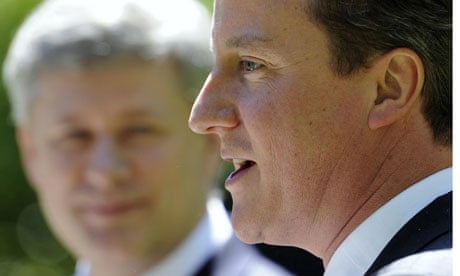The west's seven richest countries are planning to abandon a pledge to double aid to the poorest countries in Africa by this year, the Guardian has learned.
A leaked draft communique for this month's Canadian-hosted Muskoka summit contains no mention of the commitment made at the 2005 Gleneagles summit to provide an extra $25bn (£17bn) a year for Africa as part of a $50bn increase in financial assistance.
The apparent watering down of the pledge follows strong lobbying from France and Italy, which are way off track to meet their 2010 aid goals, and provides an early test for David Cameron at his first G8 summit. Britain has been at the forefront of attempts to increase western aid to Africa over the past five years, with both Tony Blair and Gordon Brown insisting that the Gleneagles promise be included in successive G8 communiques.
The pledge applies to seven of the G8 countries: Britain, the US, Germany, France, Italy, Canada and Japan – but not to Russia. The Paris-based Organisation for Economic Co-operation and Development said in April that on current plans the G8 would provide only $11bn of the $25bn pledged to Africa and would be $18bn short of the overall $50bn target.
At last year's L'Aquila summit the communique said: "G8 countries reiterated their commitments, including those made at Gleneagles and more recently at the G20 London summit, to support African efforts towards promoting development good governance and achieving the millennium development goals [the UN targets for tackling poverty by 2015]".
However, a draft communique for this year's summit, dated 26 May, makes no mention of the Gleneagles agreement. It says: "A decade of policy commitments and joint efforts with our partners has brought significant progress towards the millennium development goals but both developed and developing nations must do more; meanwhile the [financial] crisis has jeopardised advancement towards meeting some of the 2015 targets. Renewed mutual commitments are required."
Max Lawson, policy adviser for Oxfam, said: "It is a scandal that the G8 are trying to quietly drop the promise they made to the world when millions campaigned to make poverty history. The UK government should do all it can to stop this betrayal of the world's poor at the Canadian G8."
The prime minister met Stephen Harper, the Canadian prime minister, and a Downing Street source said that the final communique from the Muskoka summit would be different from the draft. "It will state that countries should be meeting their aid commitments. We don't feel there is any watering down."
Further drafting between the summit sherpas – officials from each country who prepare the communique in advance – will take place over the next three weeks, and Downing Street is confident the language on aid will be toughened up.
International development spending has been ringfenced from Treasury cuts and the coalition government has said that it will stick to Labour's legally binding target of raising development assistance to 0.7% of GDP by 2013.
Douglas Alexander, the shadow international development secretary, said: "Since Gleneagles in 2005, the Labour government worked to keep aid promises to the world's poorest high up on the global agenda. It is worrying and disappointing that the new government appears not to have made this a priority at this coming G8 summit."

Comments (…)
Sign in or create your Guardian account to join the discussion